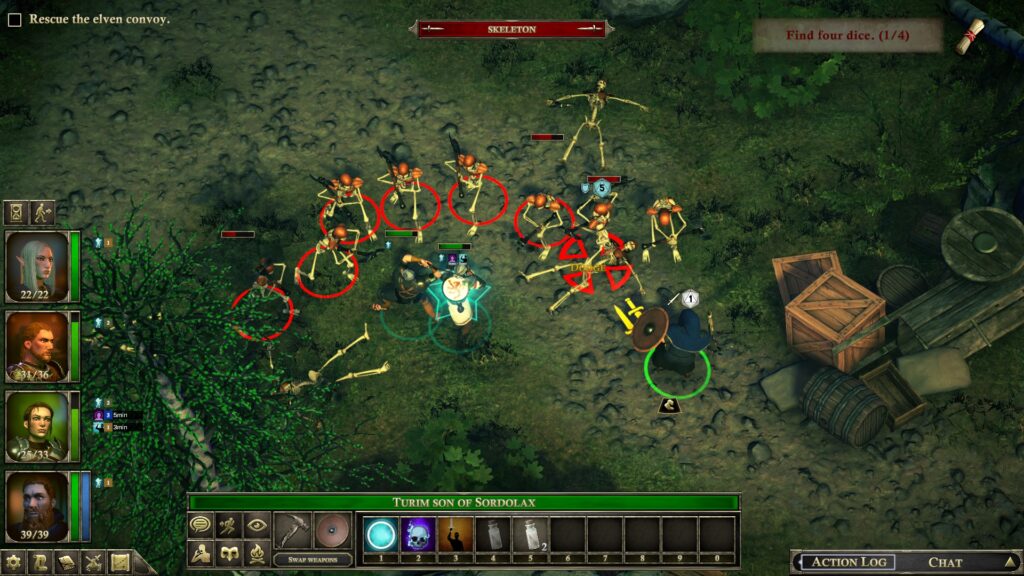
Despite being around since the mid-’80s, The Dark Eye is a relatively obscure setting outside of its native homeland of Germany. This long-running tabletop RPG was actually more popular than its American competitors like Dungeons & Dragons for a time in Europe, but hasn’t had nearly as much success on this side of the Atlantic.
Part of that can probably be chalked up to its lack of extremely successful and beloved video game adaptations. While video games based on the setting certainly exist, like DTP’s Drakensang series, the two Blackguards games, and a series of point and click adventures by Daedalic Entertainment; most have remained relatively niche.
The latest attempt to adapt the setting into a video game format is The Dark Eye: Book of Heroes, a co-op focused RPG that released earlier this month on PC. My only prior experience with The Dark Eye is the first Blackguards game, but I’m always willing to give a new tabletop-inspired CRPG a try.
The franchise hasn’t had its equivalent of a Baldur’s Gate, Neverwinter Nights, Icewind Dale, Planescape: Torment, or Pool of Radiance hit yet, and given the setting’s storied history, its probably only a matter of time before it receives a truly unforgettable video game adaptation. Unfortunately, The Dark Eye: Book of Heroes is most certainly not that game.
The Dark Eye: Book of Heroes
Developer: Random Potion
Publisher: Wild River Games
Platforms: Windows PC
Players: 1-4
Price: $29.99
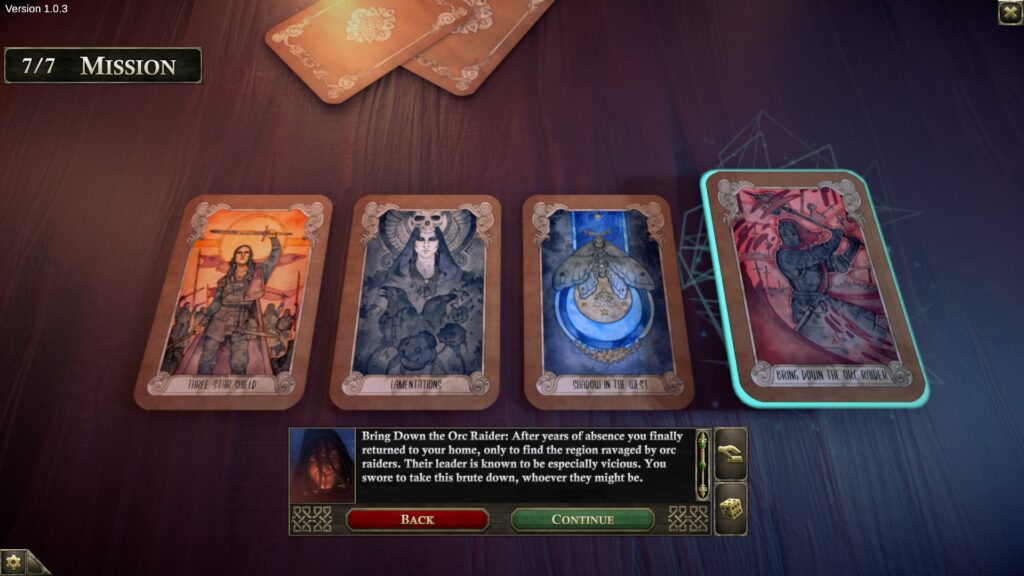
One of the things Book of Heroes definitely gets right is its tabletop-style presentation and character creator. The game starts with a brief cutscene introducing players to the land of Aventuria, followed by the chance to roll up their first character. The character creation system is visually pretty cool, and involves a seven-step process done through a fortuneteller interface where you draw cards to finalize your choices.
You’ll pick your race, class, some aspects regarding your background that modify your starting stats, your personal story, your aspirations, and finally, you’ll get to tweak your appearance. I went with a dwarven Blessed of Boron; which is essentially a melee-focused exorcist that starts with several spells based around fighting demons and the undead. Your options are admittedly pretty limited in the game. There are only four races, those being Human, Dwarf, Elf, and Half Elf, and a dozen classes.
While Book of Heroes markets itself as an RPG, and includes complex tabletop-style character sheets with dice-based combat and skill check mechanics, the game is structured more like a lobby-based co-op game along the lines of Vermintide. There is no open world, deep conversation system, sprawling narrative about saving the kingdom, or anything else of that nature in the game.
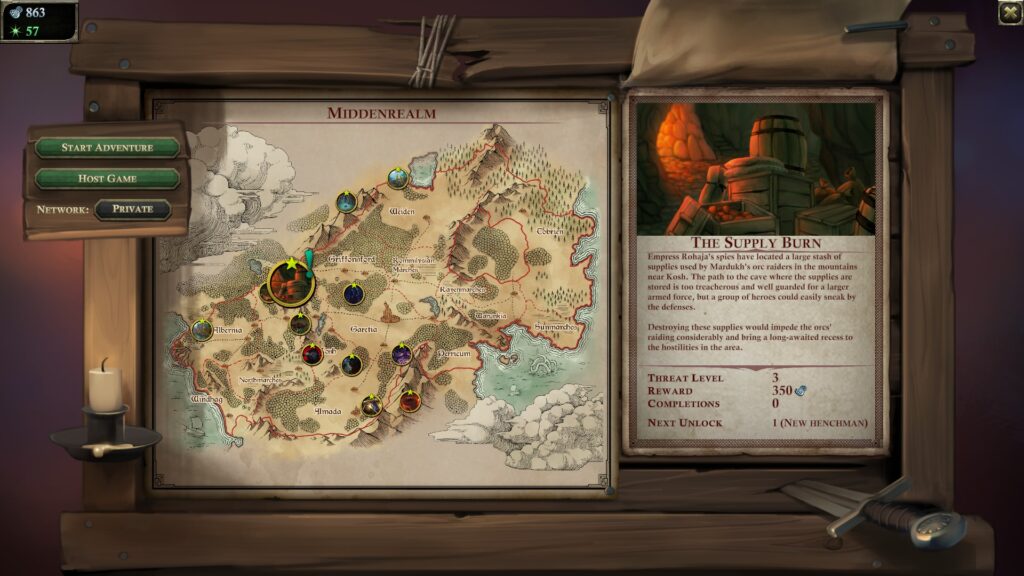
Instead, there is an inn that acts as a hub area and lobby. Here you can access your character stash, craft items, brew potions, buy and sell loot, and visit the fortuneteller to upgrade your character. There is a quest board where you select adventures, which then brings you to a self-contained, randomly generated instanced zone. These adventures all have flavor text that basically amounts to “go to this dungeon and kill the necromancer” or “destroy the bandit’s camp.”
The game’s “story” is whatever you choose as your personal quest during character creation. While I think this is a cool idea that- theoretically- leads to lots of replayability, it is very poorly implemented in Book of Heroes. My personal quest was to find and kill the orc warlord that destroyed my village. I ultimately never saw how it turned out, or even how it began, for that matter.
The first part of my personal quest involved finding four dice for a goblin gambler who promised to tell me information about where the orc warlord is. These dice are completely random drops from normal adventures. In the dozen or so hours I could stomach of Book of Heroes, I only ever found one of them. The thought of potentially playing another 30 hours in the hopes of getting all four dice to advance the main story quest to its second stage certainly didn’t help motivate me.
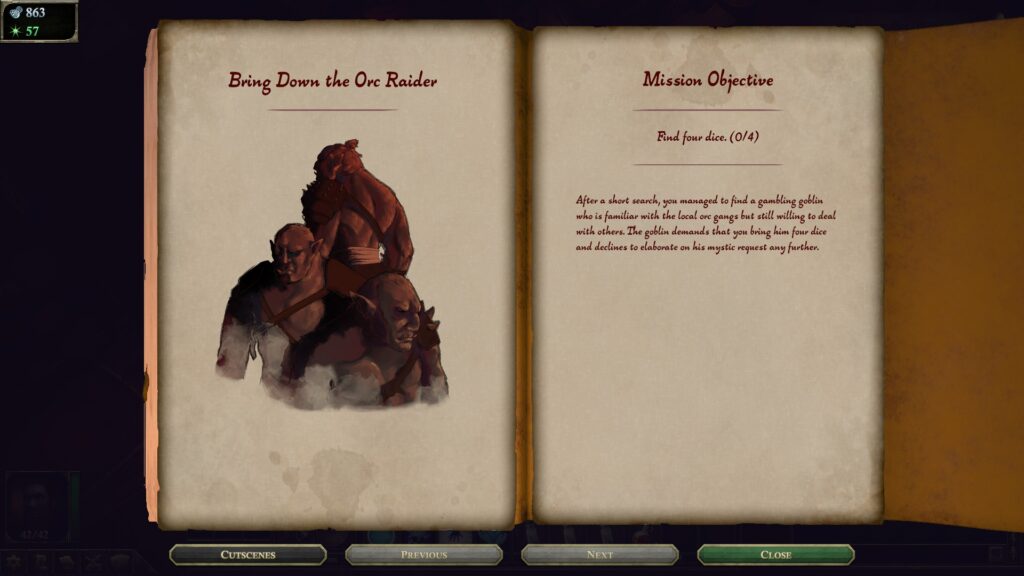
When you take out the personal quests, Book of Heroes is ultimately just about grinding generic adventures to level up your character. This allows you to grind out even more difficult quests to… Well, keep doing the same thing. You even have to play the same adventures over and over again to unlock new ones.
This wouldn’t be a terrible gameplay loop if the game was actually fun, but it simply isn’t. There is no actual skill component to the game’s combat system; its all dice rolls and gear checks. When you see enemies as a melee character, you run into combat and get locked in the engagement. You can’t even move around without passing a disengage check, so you pretty much just stand there attacking things until they die.
Since the game is entirely based on dice rolls, this can take a while as attacks wiff, or spells fizzle because the computer-generated dice roll wasn’t high enough. My character only had two situational special skills for my first five hours, so sometimes you don’t even have the luxury of spicing up your auto-attacks with a spell or two. Ranged combat is even worse because there is about a 20 second pause between each crossbow bolt as you reload.
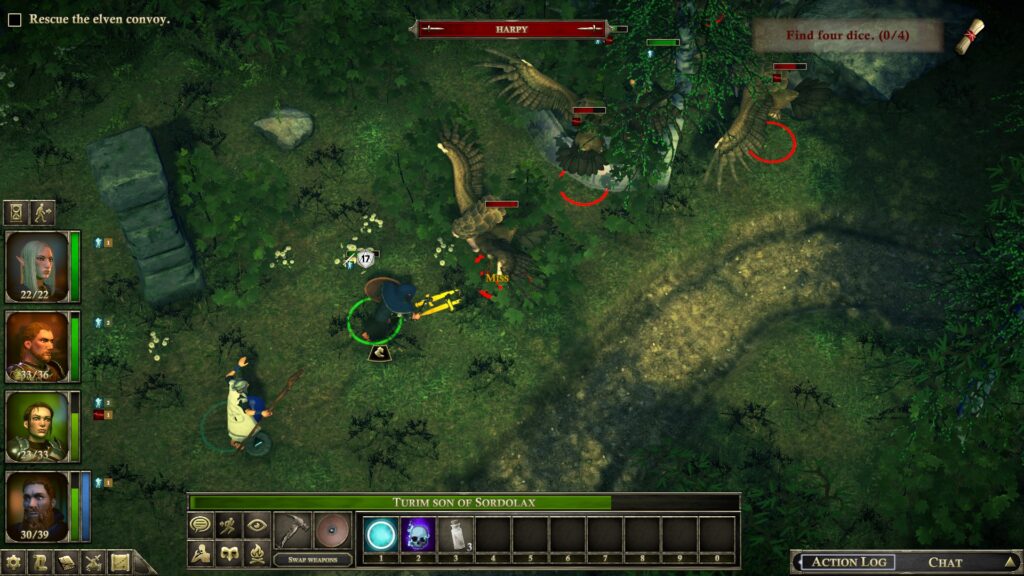
I understand that this combat is probably accurate to its tabletop roots, but its just so incredibly dull. If you run into an encounter you aren’t prepared for, then you really have no control over the outcome besides hoping the dice rolls are with you. Even the act of using a health potion is in the control of the dice gods, because most of them are a 1d3 or 1d6 health regeneration roll.
Stumbling into an adventure you aren’t prepared for is entirely possible too, because the game’s sense of quest balancing is a joke. Each adventure has a “threat” rating that gives you a very, very vague idea of what you can expect. The adventure will also tell you what kind of creature encounters might appear.
The problem is that the random generation means its entirely possible to jump into a quest you breezed through once before, only to get completely overwhelmed upon replaying it. I went into a Threat 2 goblin encounter once and throughout the entire dungeon, my party only encountered about five goblins, one orc, and four giant rats. All in all, a pretty easy encounter.
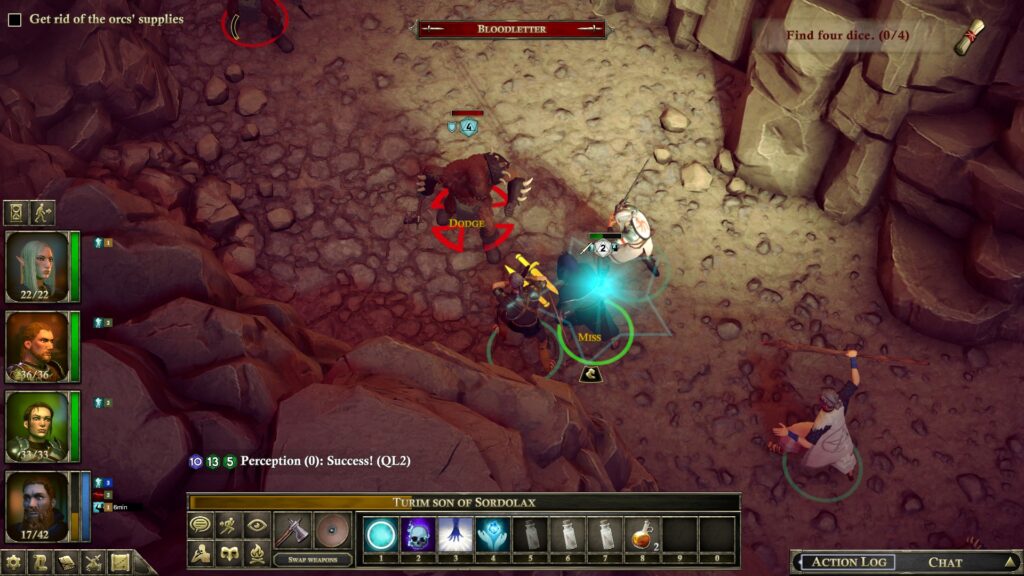
On a subsequent playthrough of the exact same adventure, however, I had a party wipe because the very first room included eight goblins before ten more started pouring in from neighboring rooms. You can find Threat 2 adventures that are twice as hard as a Threat 4 just because the random encounter generator bugged out.
Besides combat, many adventures will occasionally have some sort of puzzle. Most “puzzles” involve picking up objects and putting them on pressure plates, or placing barrels of oil next to buildings so you can press a context-sensitive “use” key that sets them on fire. Unfortunately, Book of Heroes can’t even do these simple concepts right, as quest triggers regularly bug out.
The adventure about saving an elven convoy always has a puzzle where you need to put talismans on three pressure plates to open a locked chest, but sometimes the game just won’t let you place the talismans down on the plates. The carry animation is also hilariously bad.
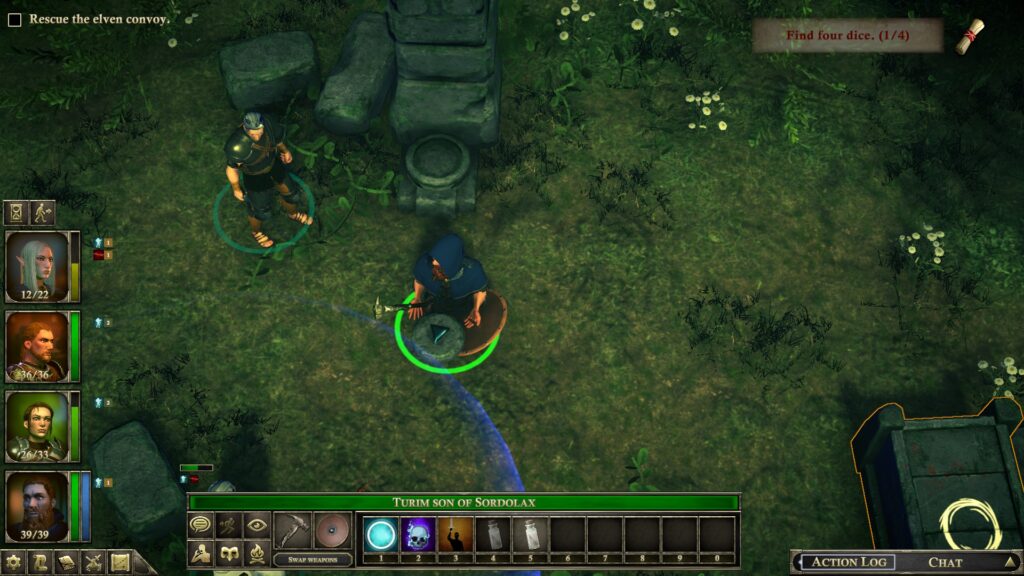
The absolute worst example of this is the Forge of Agrimoth quest, which is a frequently discussed topic on the Steam forums, because the quest is so buggy and poorly designed. After fighting your way through a dungeon, you have to cleanse a sarcophagus on a platform suspended over lava. To get to the platform, you need to offer four items to a podium. The podium will have four randomly generated cards that determine what items you need to place.
The game doesn’t explain what items are associated with what card; you need to figure that out yourself. Most of them are things like placing a weapon for War, a vial of poison for Death, a health potion for life, and so on. Some require specific books, crafting materials, you get the idea. This isn’t in and of itself the problem since this is a puzzle, after all.
The dumb part is that the items you need aren’t guaranteed to spawn in the dungeon, so you’ll need to cart around all the possible item combinations into the dungeon before starting the quest. Even if you have them all, the game’s buggy scripting means that sometimes it just won’t register the correct items as being placed in the podium. If this happens, then your only option is to just quit the quest, wasting the time you put into traveling through the dungeon, and losing any cool loot drops you may have discovered in it.
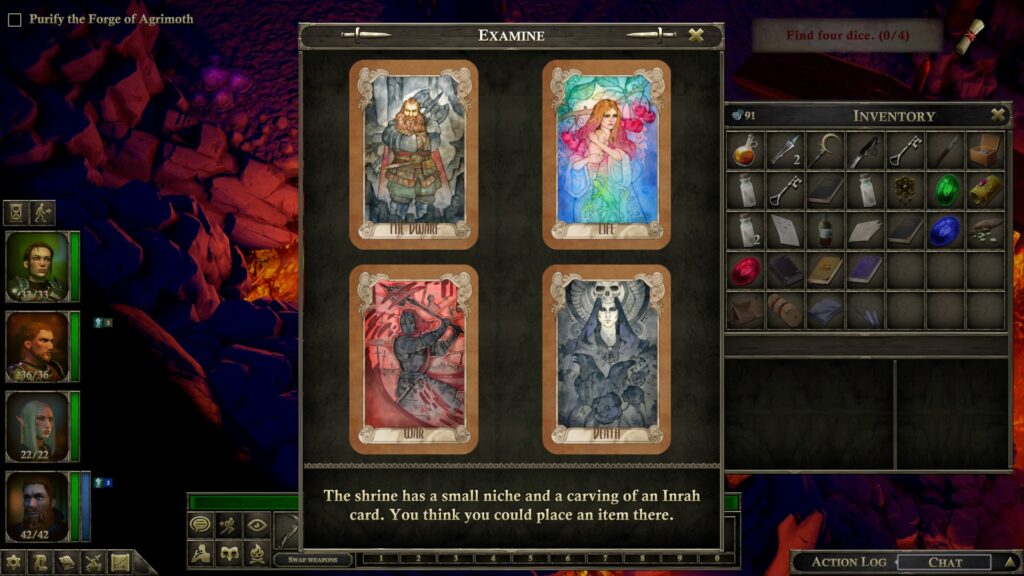
Not that cool loot drops really happen in Book of Heroes. The game is quite stingy with its loot and rewards. Most of the time you’ll just find some arrows, crafting materials, and precious gemstones that serve no purpose beyond being sold at the tavern.
Most of the weapon and armor drops are just stuff you can buy at the inn’s vendor anyway. Its even quite common to stumble across empty chests. At one point I even found a boobytrapped chest that only contained five arrows.
Sometimes you’ll also encounter NPCs you can talk with during adventures, but I wouldn’t call this a true conversation system. For example, there is one quest where you are trying to rescue a prisoner being held hostage by bandits. If you talk to their leader and pass a speech skill check, you can trick them into letting the prisoner go without a fight. If not, then you’ll have to fight them. That is the extent of the game’s conversation system.
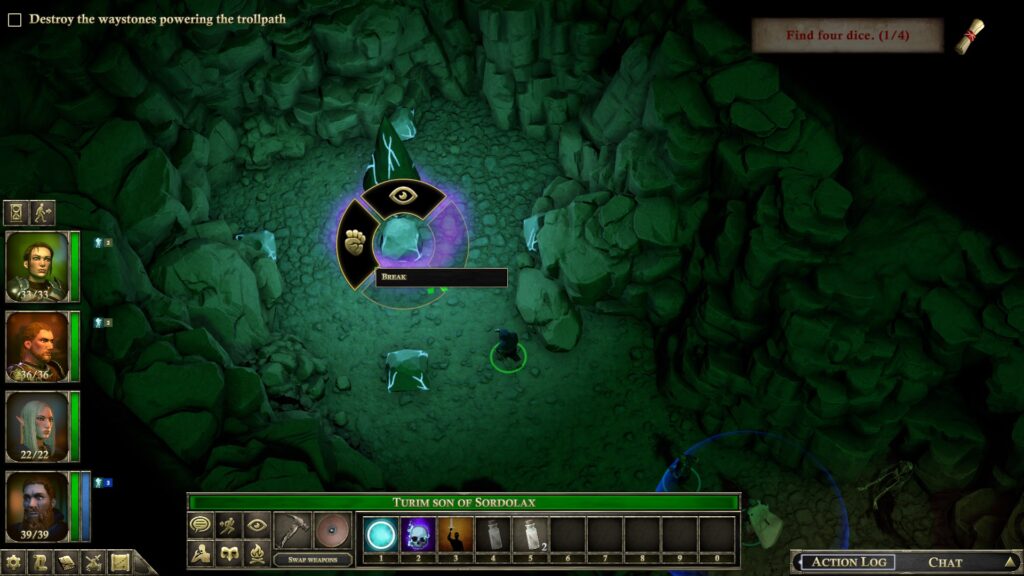
I was never able to actually test the multiplayer portion of Book of Heroes. I don’t know anyone who owns a copy, and the few people who are actually playing this game seem to only play with friends, or keep their sessions locked, because I couldn’t even find randoms to match with.
If you don’t wish to subject your friends to Book of Heroes, you’ll be stuck with the game’s AI companions. These companions have no real story or personality, and exist solely to pad out your party. You can’t even customize or improve them in any way. You start the game with access to two warriors, a wizard, and a rogue, with new companions gradually unlocked as “rewards” for completing adventures.
The basic companions are free, but the more advanced ones cost a small fee to hire. It honestly feels like the game is punishing you for not playing multiplayer. Not only do you have to pay to hire the “better” companions, but they are all completely dumb and useless.
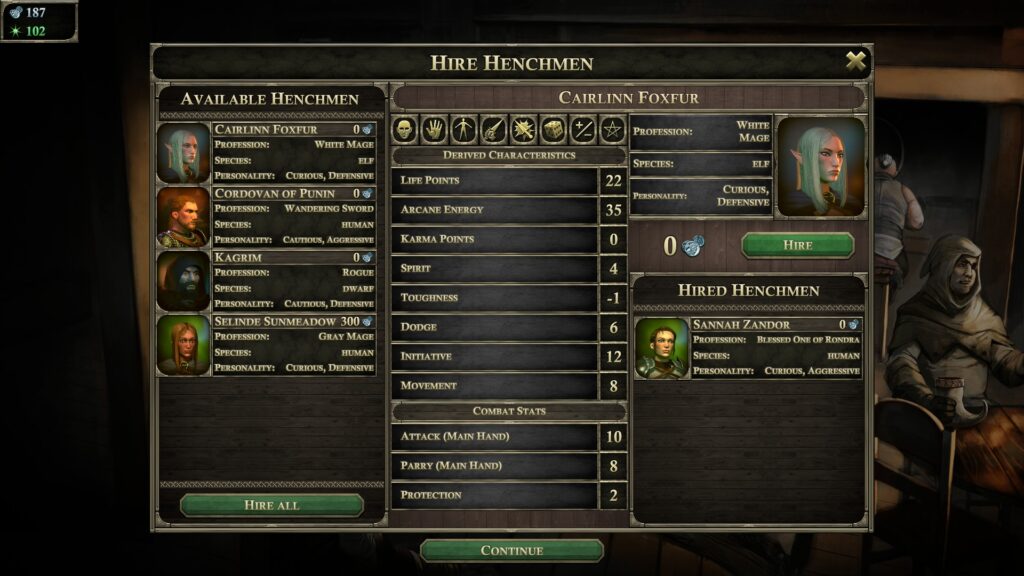
Each companion has personality traits like “aggressive” or “curious,” which is a fancy way of saying that they run off on their own, pulling aggro and exploring the map without you. You can use the quick chat menu to issue commands to the AI, but they treat them more like suggestions than actual orders.
They might follow you around for a while when you issue the “follow” order, but they’ll eventually get bored and decide to go poke an orc to see what happens. If you stumble into a battle, the AI will try to come back and join the fight, but that doesn’t stop them from running off to pick fights by themselves.
The AI, both friendly and enemy, is also just really, really buggy. It’s not uncommon for them to get stuck on terrain, or each other, as they try to rush into a melee. They will even walk directly onto traps you’ve already spotted. I’ve seen the AI get stuck in an infinite loop by colliding with terrain where their character model glitches out and can’t move or attack anymore.
Some ranged enemies are particularly annoying. Goblins with bows have a tendency to run away from battles with such speed that they could make Sonic green with envy, only to return once their reload cooldown is over to shoot another arrow. Enemies with both ranged and melee weapons will sometimes get stuck in a loop where they run away to break engagement, then run back into the melee.
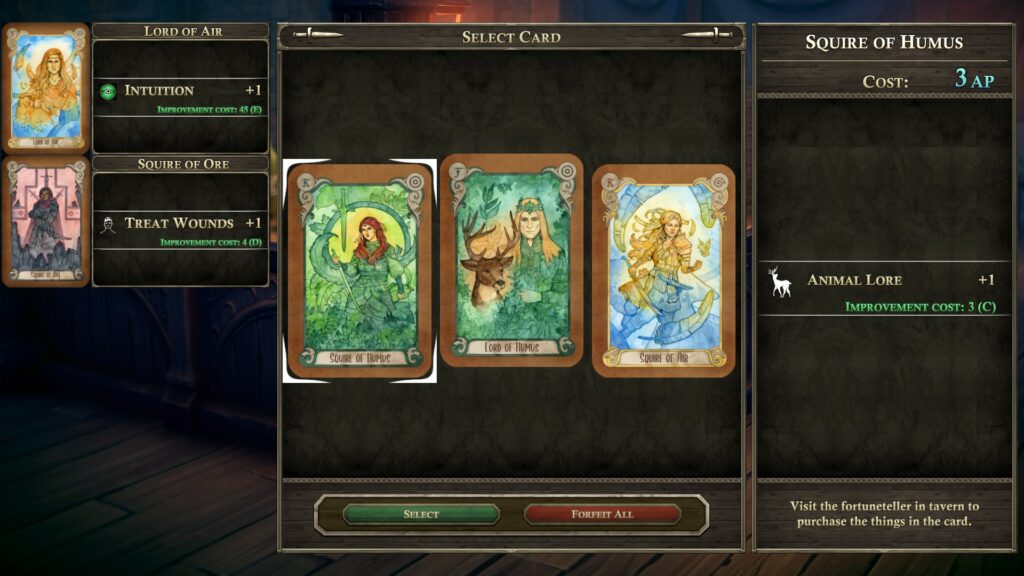
When you do complete an adventure, you are awarded with Adventure Points, and can pick from one of three cards. Each card will contain one upgrade for your character, like +1 to a stat, a new skill, an upgrade to an existing skill, and so on. To actually upgrade your character though, you have to go to the fortuneteller.
From here, you spend AP to purchase any cards you currently have, or spend money to upgrade a card you haven’t redeemed yet. You should always choose to upgrade a card before actually buying it. This increases the AP cost of a card, but unlocks two extra upgrades on the card.
While this system is interesting, the ultimate problem is that the card aspect of upgrading your character is completely and totally random. You might choose a card that contains an upgrade that is relevant to your class and build, but once you spend money upgrading it, the other two effects are kind of useless to you.
This means that you have very little control over how you build your character. The random generator provides cards that are somewhat relevant to your class in theory, but often just throws you random stats that you aren’t really focused on. I’m a dwarven fighter, so why are you giving me cards for Plant Lore and Alchemy?
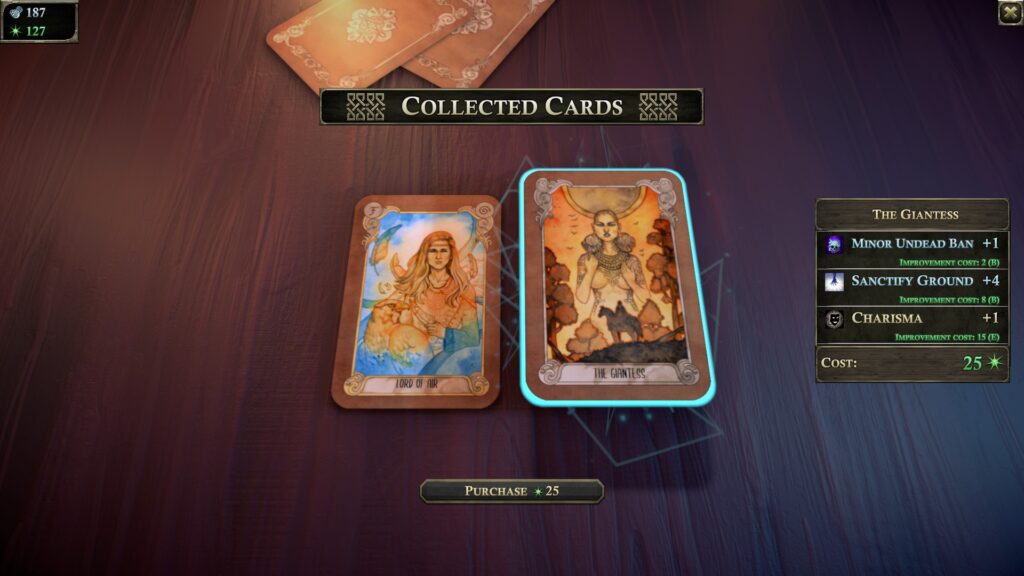
Even when you do get stuff relevant to your class, it might not be relevant to your build. The first new skill I ever got required swords to use, but I had been focusing on impact weapons, so it was effectively a dead skill.
You can spend money to redraw cards, but this only works on cards that you haven’t upgraded yet. Even still, you are spending money on the chance of maybe drawing a card more relevant to your build and class. The whole character progression system is nonsense and makes it extremely hard to actually focus your build.
If all these problems weren’t enough, Book of Heroes is a technical mess as well. Despite looking ancient, the game still manages to have big frame drops and stuttering. Load times can also be extremely hit or miss. Sometimes the game will load up almost instantly, while other times it can take upwards of a minute.
The UI and interface are also archaic. Actually, I take that back. I grew up playing RPGs that were more intuitive and smooth than Book of Heroes. The game only features drag-and-drop in specific places. You can drag-and-drop in your inventory, but you can’t drag potions or skills to your hotbar. Instead, you have this abomination of a system where you right-click on a hotbar slot and scroll through all the potential things you can slot into the hotbar.
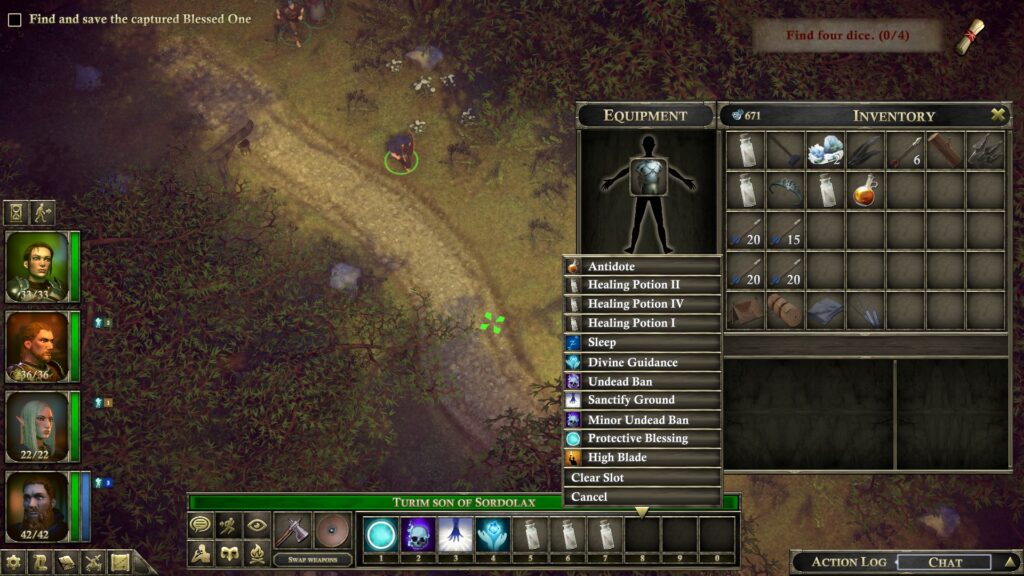
Speaking of scrolling, mouse wheel scrolling only works in specific places. Sometimes its fine, but other times it doesn’t scroll with the mouse wheel, or just scrolls extremely slowly. The shop inventory is also horrible. You have to scroll through a long list of items to buy; and when you want to sell, you have to scroll through that as you individually select everything you want to sell.
The most bizarre part is that the game uses a traditional grid-based inventory, and there is a ton of wasted space on the right side of the screen. Why doesn’t it just display my inventory there and let me drag and drop stuff? There is also no way to compare armor and weapons in the shop with what you currently have equipped, which is something RPGs figured out decades ago.
Like so many other aspects of the game, tooltips are only implemented about half the time in Book of Heroes. You can hover-over to view stuff on your hotbar, but can’t hover-over to view status effects currently afflicting you and your party.
There are tiny icons that feature tooltips that say the name of the effect, but not what it does. If you want to know what status effects do, you’ll have to read up about them in an encyclopedia back at the inn that isn’t accessible while out on an adventure.
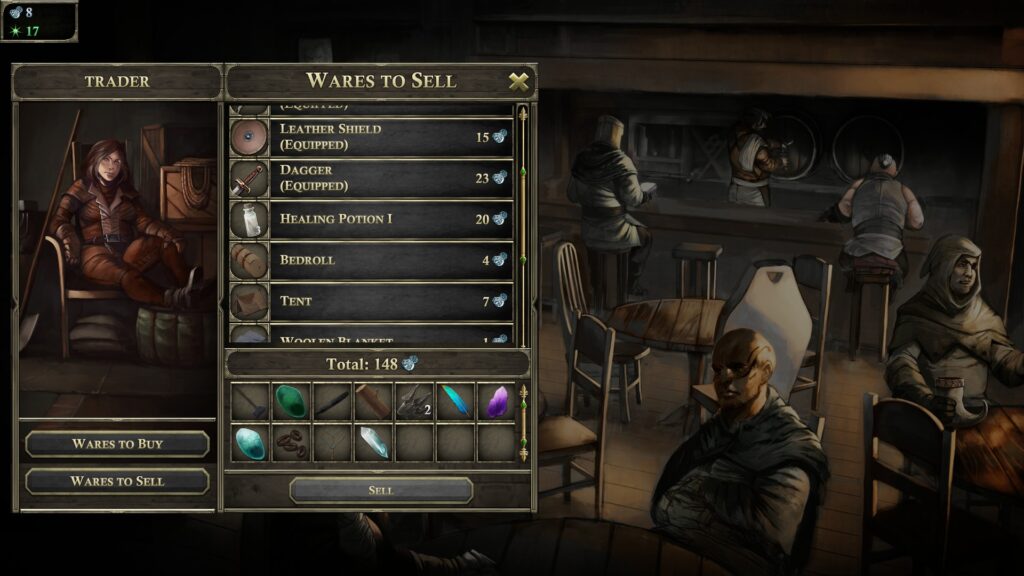
The clunky and unintuitive interface makes it seem like Book of Heroes was designed with consoles in mind, but it’s only available on PC. The game doesn’t even have controller support, so I have no idea what they were going for with some of these UI choices.
The Dark Eye: Book of Heroes is an extremely primitive RPG that is so full of bugs, unintuitive mechanics, and boring adventures that I never once was in danger of having fun in the dozen or so hours I spent with the game before I finally just couldn’t take it anymore.
The game’s handful of fans have a go-to response for such critique that generally involves saying “play it with friends, that is how its meant to be played.” The tired old “its better with friends” argument has been around for ages, and its one of the dumbest defenses of a bad video game you can make. Literally everything is better with friends.
If I want to play a game with friends, we’ll pick a good co-op game instead. Divinity: Original Sin 2 or Grim Dawn might not offer the same tabletop RPG experience as Book of Heroes, but those games are fun on their own.
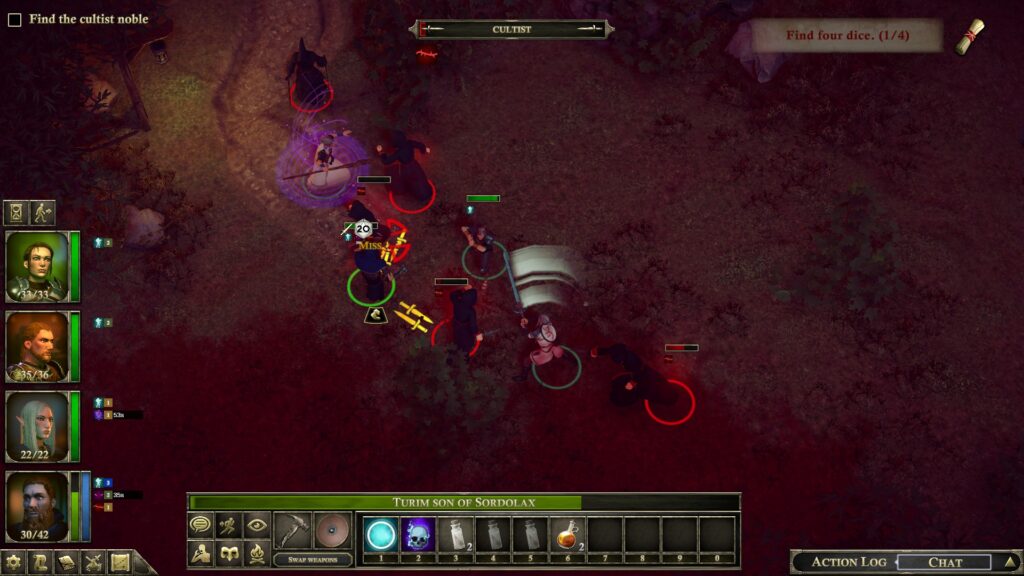
Considering the fact that Book of Heroes doesn’t even feature a real story or coherent character progression, then I don’t think that even die-hard fans of The Dark Eye will really enjoy it. I don’t know who this game is supposed to be aimed at, but for me it was one of the most boring RPG experiences I’ve had in a long time, and that’s before even getting into all the bugs and genuinely awful design decisions.
The Dark Eye: Book of Heroes was reviewed on Windows PC using a review copy provided by Wild River Games. You can find additional information about Niche Gamer’s review/ethics policy here.